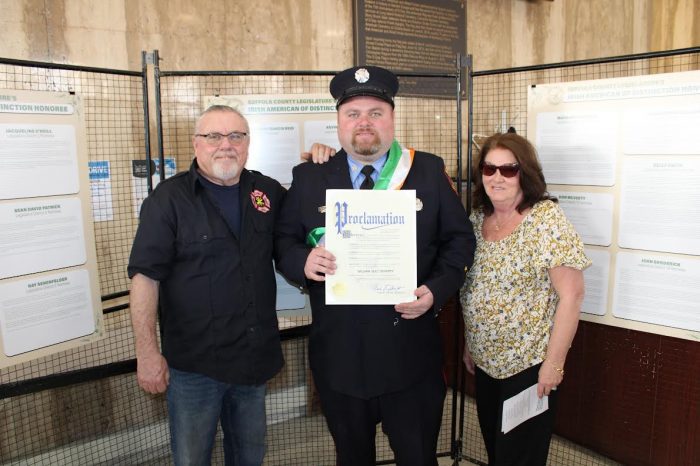Suffolk County Legislator Steven Englebright (D-Setauket) has named Andrew Polan as the Fifth Legislative District’s Jewish American of Distinction for 2024.
“Andy is a steadfast figure in the Three Village Jewish American community and the surrounding area,” Englebright said. “He is a beacon of dedication and service.”
Last year, Suffolk County officials designated the first Wednesday of May as Jewish American Heritage Day in Suffolk. Elected county officials in conjunction with the American Jewish Committee held a ceremony on Wednesday, May 1, at the H. Lee Dennison Building in Hauppauge. Each county legislator chose a Jewish American of Distinction to represent their district.
Polan, a former North Shore Jewish Center board president, continues to be an active member of the congregation. Rabbi Aaron Benson fondly describes him as “an all-around mensch and a sweetheart.” Polan’s reputation is one of quiet and humble giving, always ready to lend a helping hand.
The honoree is also an active member of Village Chabad in East Setauket and is the board president of Stony Brook Hillel, which strives to give Stony Brook University students a community where they can explore their relationship with Judaism, Israel and each other.
The owner of Stony Brook Vision World, Polan is a member of the Three Village Chamber of Commerce and one of its past presidents. Among his accomplishments, he has been credited with facilitating the installation of the chamber’s sign on Nicolls Road and Route 347. He was also an ardent volunteer and supporter of the Walk for Beauty, which was held annually at Stony Brook Village Center. Proceeds from the event were donated to a targeted Stony Brook Medicine breast cancer research fund.
Polan follows in the footsteps of his father, Sheldon, who was also an optician. His father was a World War II vet, and in addition to serving his Vision World customers, Andy Polan is the resident optician at the Long Island State Veterans Home at Stony Brook University. At the veterans home, he is known to go above and beyond to ensure the veterans’ eye care needs are met.
Polan said he was honored and flattered to be chosen by Englebright.
“At a time when unity is so important, I am honored to be recognized and included with others who have contributed so much to bringing others together,” Polan said.






